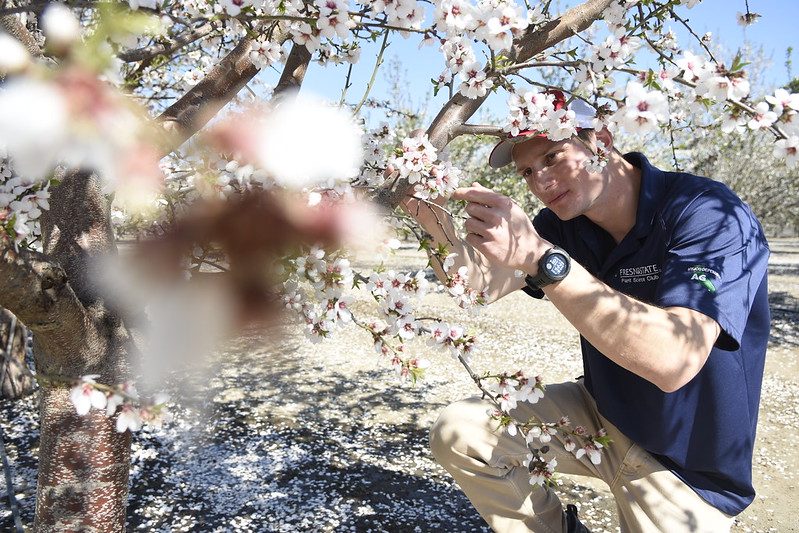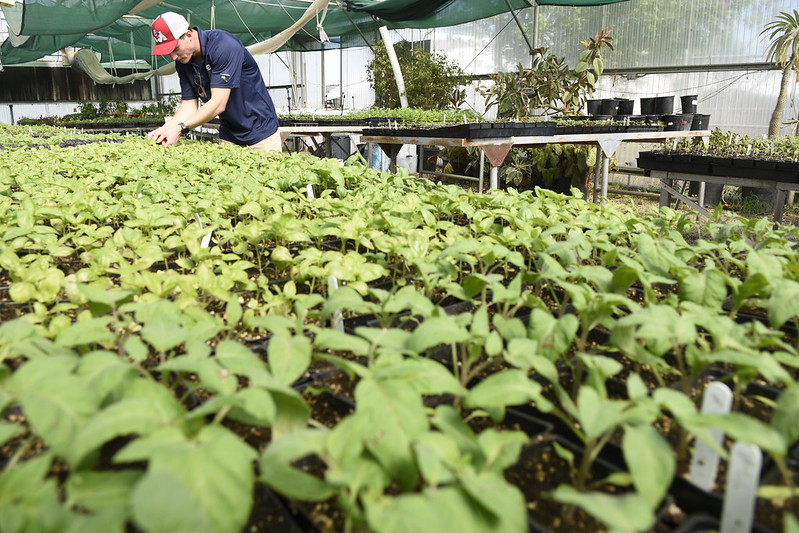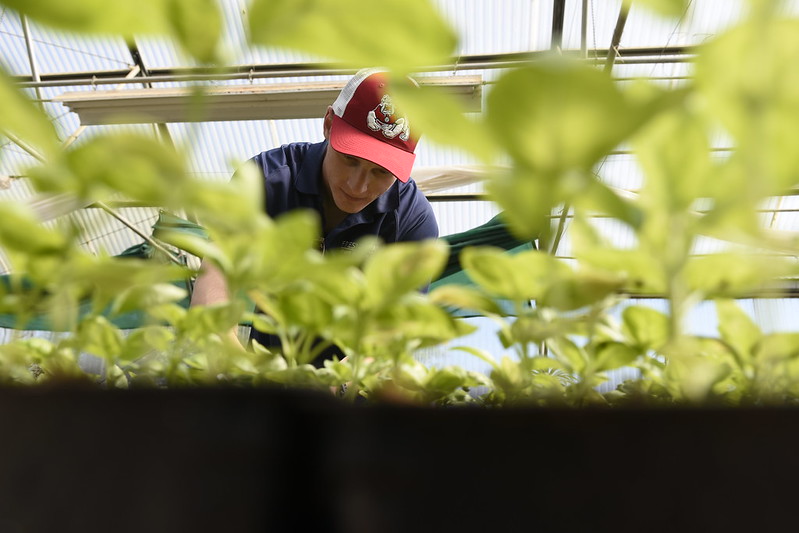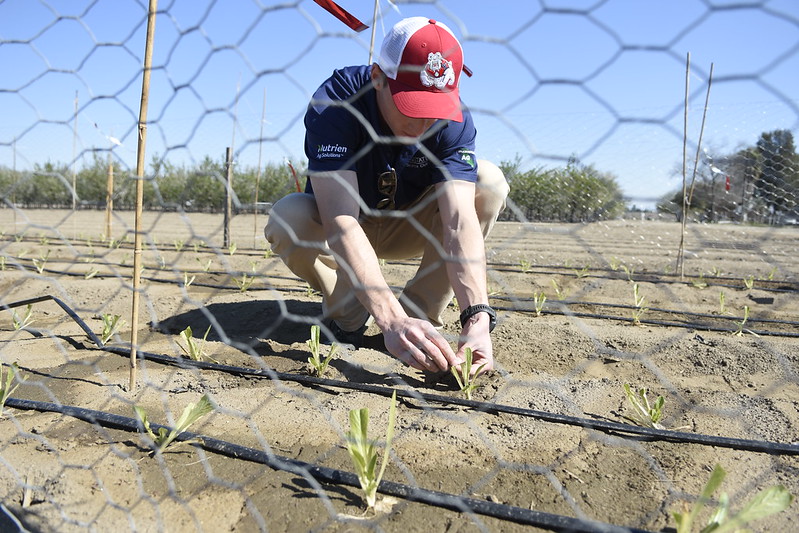The Jordan College of Agricultural Sciences and Technology
| Picture |
|---|
 |
 |
 |
 |
Plant Science Student Spotlight: Omar Abulghanam
Fresno State senior Omar Ghassan Fayez Abulghanam's drive to help shape agriculture in the Central Valley and around the world has led him to the Fresno State Plant Science Department and a host of hands-on opportunities.
The Fresno native transferred in with an associate's degree in business from Clovis Community College, and has shined at Fresno State with President’s List (4.0 GPA) recognition his first several semesters.
That excellence in the classroom also helped him finish fourth at a national speech contest focused on climate change and global sustainability practices.
He has been equally active preparing for an agricultural career through campus club activities and a USDA internship where he studies soil samples related to gas, moisture and nitrate topics.
Learn more in this recent interview why he is interested in studying salt-tolerant plants and hydraulic water-soil conductivity (and other hydro-related issues that many California farmers currently face).
Q: Where are you from originally, and how did you choose to attend Fresno State?
Abulghanam: "I am a native of Fresno, while my family is originally from Amman, Jordan. I chose Fresno State because of its exceptional agriculture program and the accomplishments of the Jordan College and the promising students it graduates."
Q: Do you have any other family members that are Fresno State graduates?
Abulghanam: "My father, Ghassan Abulghanam, graduated with his bachelor's degree in business administration and management in 1985. My brother, Zaid Abulghanam, received his master's degree in special education in 2020."
Q: Which are some of the classes & faculty that have influenced you at Fresno State?
Abulghanam: "My soils and propagation classes have had the biggest impact because they both teach important topics such as soil management, climate change and maximization of agricultural production."
Abulghanam: "Dr. Sharon Benes and Mr. Jacob Hurst have had a big impact on my academic career, both helping me augment my academics with my career path. They both make time for me outside of class to assist me with questions regarding my work at the USDA, as well as academic help. Dr. Benes actually reached out to me first and suggested I apply for the state agronomy society scholarship (which he received this semester), and she helped me nearly every step of the way. This scholarship wouldn't have been possible for me without Dr. Benes. Marlene Miyasaki has also been a tremendous help, guiding me down the best academic path, always offering her advice, no matter how busy she is. Marlene has offered me valuable advice regarding scholarships, plant science meetings, SASES conferences, and graduate school."
Q: Have you had a chance to work with on the campus farm yet?
Abulghanam: "I am hoping to with Dr. Ranjit Riar this semester. I would be interested in helping with irrigation and fertilizer scheduling, as I enjoy applying my soils knowledge to soil management practices. I enjoy learning about the nitrogen cycle and would be interested in innovative new irrigation methods that reduce nitrate leaching into groundwater systems. I believe this would prepare me for my career path because my ideal career is becoming a soil scientist or working as a technician for one. I can use this experience in my career when advising farmers or conducting research."
Q: Have you been involved with research on campus, and how will it benefit your career path and the industry?
Abulghanam: "This is my first semester involved with research at Fresno State. I will be helping Dr. Sharon Benes process soil and tissue samples, then assist with some EM38 surveys (salinity mapping) starting in April and continuing through June. I believe this experience can help me format research ideas, which I can use during my master's program and continue into my career."
Abulghanam: "(This experience is important because) On the west side of the Valley, many of our soils are affected by high salinity concentrations, and as the climate in the Western Hemisphere becomes increasingly arid, farmers are looking for new and efficient ways of leaching the salts out of their soils (as previous leaching methods are unfeasible due to decreasing water supplies)."
Q: What was your background in agriculture before you started at Fresno State?
Abulghanam: "Honestly, prior to studying plant science, my agricultural knowledge was extremely limited. My current USDA internship as a Biological Science Technician is my first career-related job. Prior to this, I worked retail jobs to make ends meet, because all of my financial obligations have fallen on me. Having a family originating from Jordan, I don't have a family farm or any agricultural experience prior to attending Fresno State unfortunately."
Q: Talk about your experiences with clubs or teams at Fresno State.
Abulghanam: "Last fall I was involved with regional soils judging competition where our Fresno State team placed fourth. With the plant science club this winter, I was honored to compete in the oral contest at the SASES (Students for Agronomy, Soils & Environmental Science) Conference where I competed in the soils judging event and quiz bowl. I am also currently working with Dr. Florence Cassel in attempting to revitalize the irrigation club and serving as its president."
Q: Have you participated in any other outreach events that have benefited the community or youth?
Abulghanam: "I have volunteered as a group leader recently at the FFA (Future Farmers of America) state citrus judging competition hosted by Fresno State. As well as an upcoming judge at the 4-H Festive Food Faire in March."
Q: Have you traveled to any conferences and what were your experiences like?
Abulghanam: "I attended the SASES national conference in Salt Lake City, Utah last fall, which is where I placed fourth in the speech competition. I also attended the 2022 California Plant and Soil conference where I enjoyed lectures from our faculty Dr. Anil Shrestha, Dr. Sharon Benes, and Dr. Ranjit Riar, and other professors all over California."
Q: Have you overcome any challenges to get where you are today that have shaped who you are?
Abulghanam: "Financial challenges have been the hardest thing I've faced as a student who pays his own bills and tuition. That is why I'm extremely grateful as the Ag One-Dick Markarian Scholarship Award recipient in the fall of 2021, because it really has helped."
Q: What's your potential next career step, and how would you plan to use your degree eventually?
Abulghanam: "I would like to get into research and development for either the state or federal government here in California. I would like to continue my education into graduate school and utilize my academics in researching combating climate change through projects like carbon sequestration within soils or Whole Orchard Recycling (where farmers spread their previous crops as wood chips over their orchards pre-planting, rather than burning). I would like to continue learning about the nitrogen cycle and how to combat N2O emissions from the soil, as well as reduce nitrate leaching into groundwater."